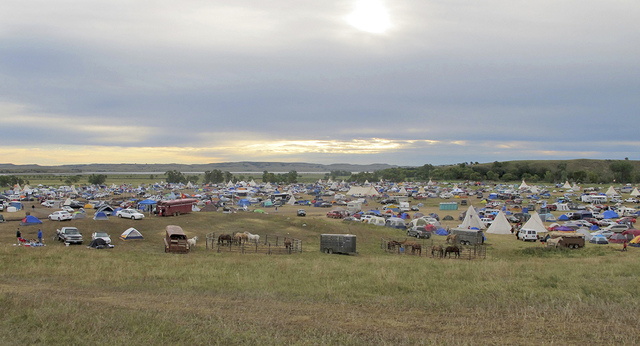BISMARCK, N.D. — The sprawling encampment that’s a living protest against the four-state Dakota Access pipeline has most everything it needs to be self-sustaining — food, firewood, fresh water and shelter. Everything, that is, except permission to be on the
BISMARCK, N.D. — The sprawling encampment that’s a living protest against the four-state Dakota Access pipeline has most everything it needs to be self-sustaining — food, firewood, fresh water and shelter. Everything, that is, except permission to be on the federal land in North Dakota.
Federal officials say they won’t evict the Oceti Sakowin, or Seven Council Fires camp, due to free speech reasons, even though it’s on U.S. Army Corps of Engineers land near the confluence of the Missouri and Cannonball rivers that many Native Americans believe is still rightfully owned by the Standing Rock Sioux under a nearly 150-year-old treaty.
“We’re not leaving until we defeat this big black snake,” camp spokesman Cody Hall said of the pipeline.
But residents in the area have expressed feeling unsafe and frustrated with how the protest has swelled to scores of self-described “water protectors” who have joined the tribe’s fight, and Republican U.S. Rep. Kevin Cramer — North Dakota’s lone voice in the House — says the camp is illegal. He blames the agency for looking the other way.
“If that camp was full of people advocating for fossil fuels, they would have been removed by now,” Cramer said. “There is some discretionary enforcement going on.”
The camp is the overflow from smaller private and permitted protest sites nearby and began growing in August. The gathering has been called the largest gathering of Native American tribes in a century, all there to protest Dallas-based Energy Transfer Partners’ $3.8 billion Dakota Access pipeline, which tribal officials believe threatens sacred sites and a river that’s a source of water for millions.
Corps spokeswoman Eileen Williamson said the agency is “encouraging” people to relocate to areas where there is a permit, such as a nearby smaller camp where demonstrators have been allowed to legally protest on federal lands managed by the agency.
“We don’t have the physical ability to go out and evict people — it gives the appearance of not protecting free speech,” she said. “Our hands are really tied.”
Cramer believes the “bigger problem” of the camp is “the illegal activity that may be orchestrated from there” — meaning a base to launch interference with pipeline construction miles away. About 95 people have been arrested in several pipeline protests — some as far as 70 miles away from the camp — since early August, but none at the camp itself. Protesters deny state officials’ charge, with Hall saying the camp promotes “peaceful” protest.
“People don’t leave from the camp with malicious intent to do harm,” Hall said. “There are always going to be a few bad eggs in any group you can’t the message to.”




